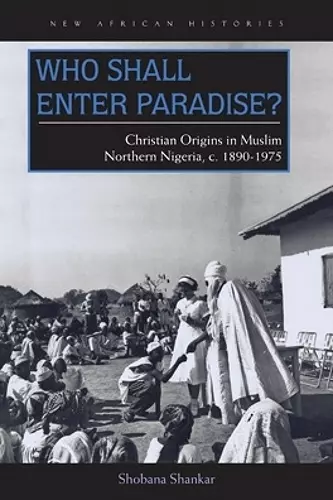Who Shall Enter Paradise?
Christian Origins in Muslim Northern Nigeria, c. 1890–1975
Format:Hardback
Publisher:Ohio University Press
Published:15th Oct '14
Currently unavailable, and unfortunately no date known when it will be back
This hardback is available in another edition too:
- Paperback£27.99(9780821421246)

Who Shall Enter Paradise? recounts in detail the history of Christian-Muslim engagement in a core area of sub-Saharan Africa’s most populous nation, home to roughly equal numbers of Christians and Muslims. It is a region today beset by religious violence, in the course of which history has often been told in overly simplified or highly partisan terms. This book reexamines conversion and religious identification not as fixed phenomena, but as experiences shaped through cross-cultural encounters, experimentation, collaboration, protest, and sympathy.
Shobana Shankar relates how Christian missions and African converts transformed religious practices and politics in Muslim Northern Nigeria during the colonial and early postcolonial periods. Although the British colonial authorities prohibited Christian evangelism in Muslim areas and circumscribed missionary activities, a combination of factors—including Mahdist insurrection, the abolition of slavery, migrant labor, and women’s evangelism—brought new converts to the faith. By the 1930s, however, this organic growth of Christianity in the north had given way to an institutionalized culture based around medical facilities established in the Hausa emirates. The end of World War II brought an influx of demobilized soldiers, who integrated themselves into the local Christian communities and reinvigorated the practice of lay evangelism.
In the era of independence, Muslim politicians consolidated their power by adopting many of the methods of missionaries and evangelists. In the process, many Christian men and formerly non-Muslim communities converted to Islam. A vital part of Northern Nigerian Christianity all but vanished, becoming a religion of “outsiders.”
“Shankar challenges the assumption, so common in the history of Western education and modernity, that the North is backward in both because it did not allegedly encourage the spread of education and Christianity.…The book is very clear on religious co-existence, and also on the changes to Islamic culture. Thus, its conclusions open up new avenues to examine further the impact of Christianity on Islam and vice-versa.” * American Historical Review *
“Perhaps the most important contribution of the book is Shankar’s acknowledgment that [Northern Nigeria] possessed all elements of modernity for a long time. … The evidence of non-Islamic influences, very well developed in the book, expands the historiography of the colonial era … There is a lot in this book that offers leads for new directions, notably in the dimension of a prayer economy.” * American Historical Review *
“This book by Shobana Shankar is a real eye-opener: she reveals the world of Christians, since 1890 half-hidden within Nigeria’s Muslim Hausaland, both as a community and as a series of remarkable individuals. Missionaries and converts alike are treated with insight and a remarkable depth of detail, culled from rarely read sources.”
“…A landmark work that will usher in new era of writing on northern Nigeria.…[Its] pertinence lies in its potential as an alternative source to counterbalance the misleading yet popular narrative which prefers to depict the part of Nigeria commonly called the ’core north’ as being an almost, if not, exclusive preserve of Muslims.” * Africa at LSE blog *
“Unsettling much of the received history of religion in Nigeria, this original, deeply compelling history shows how Christianity and Islam have been mutually imbricated as lived religions and even co-constituted across time.”
“This wonderful, engaging study of the complex and often unexpected history of Christian and Muslim mutual formation in Nigeria begins with the life stories of striking individuals and then traces the gradual emergence of medical and educational infrastructure. Highly recommended for scholars of the politics of religion and of African history, this will also serve as a fine text for undergraduates.”
ISBN: 9780821421239
Dimensions: unknown
Weight: unknown
240 pages